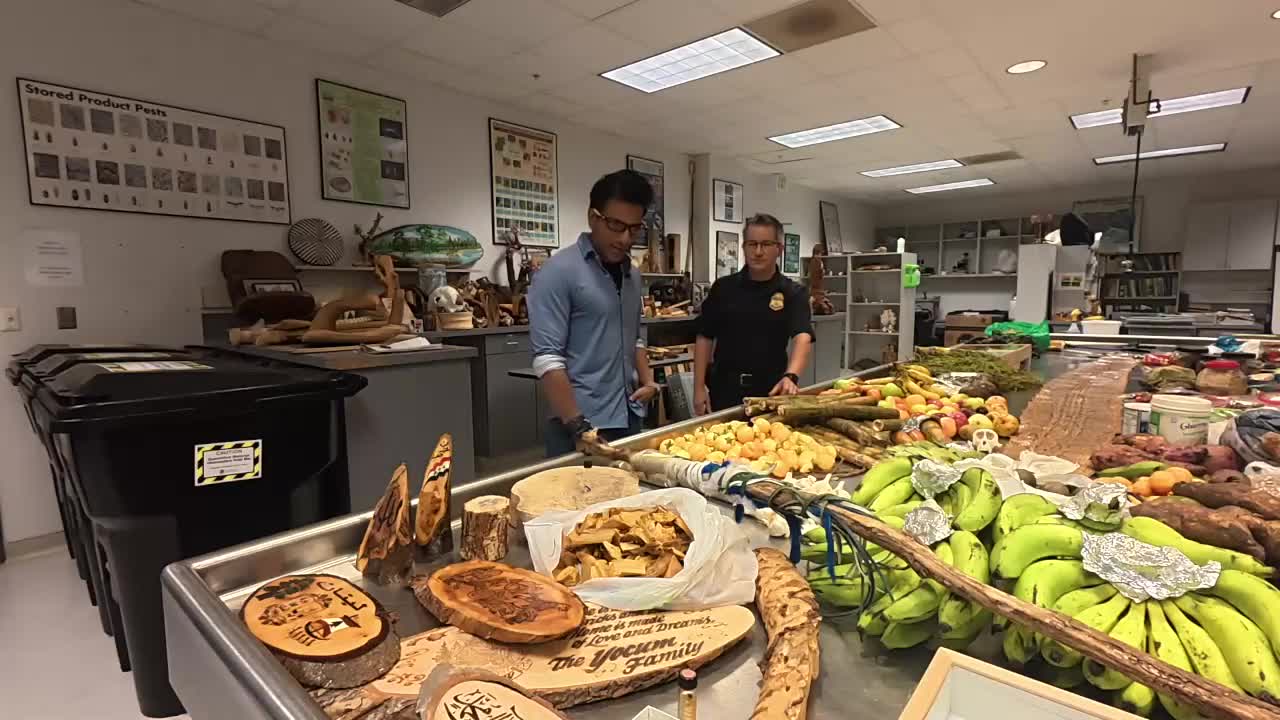ROMULUS, Mich. (WXYZ) — When travelers return from overseas trips, they typically worry about whether their souvenirs will survive the flight. But at Detroit Metro Airport, U.S. Customs and Border Protection agents are discovering items in passenger luggage that pose serious threats to American crops, the environment and public health.
Agriculture specialist Tyler Fox, who has worked with CBP for over 20 years, spends his days preventing harmful pests and diseases from entering the country. His work takes place in a restricted airport laboratory where confiscated contraband is investigated and analyzed.
Watch Faraz Javed's video report below:
"This is one week's worth of contraband," Fox said, gesturing to tables covered with seized items.
The lab contains an alarming variety of prohibited materials, from exotic fruits and vegetables to seeds intended for growing crops. Each item represents a potential threat to American agriculture and ecosystems.
"These are all the exotic fruits, vegetables, different seeds to grow," Fox explained.

Even seemingly harmless items can harbor dangerous organisms. Garlic can carry diseases, while bananas may contain scale insects or exotic ant colonies. Fox showed examples of eggplant that contained destructive pests.
"If something like that was to get into the environment, it could decimate eggplant crops here," Fox said. "A lot of times, these exotic pests don't have any natural predator here. So when they get here, they just run rampant and cause destruction, and it either causes farmers to use more pesticides or the produce prices to go up."

According to the U.S. Department of Agriculture, invasive species cost the U.S. tens of billions of dollars each year.
Rice showed us particular concerns due to the khapra beetle, a small insect that becomes extremely difficult to control once it infiltrates grain storage facilities. Fox also displayed damage caused by the Asian longhorn beetle, showing how larvae tunnel through wood and completely destroy trees.

The contraband extends beyond plant materials. Fox revealed preserved bats that a passenger had attempted to bring as bushmeat from Africa.
"Those are regulated because of their potential to pass on disease," Fox said.
When asked about confiscating someone's dinner, Fox acknowledged the cultural significance of such items while emphasizing public safety.
"It doesn't feel great. Again, we understand it's a big part of culture, but we also have to protect the population from potential disease outbreak," Fox said.

Passengers often attempt to conceal prohibited items through mislabeling. Fox showed packages labeled as "Chinese tea gift" that actually contained seeds, items marked as "shrimp" that held sausage and containers labeled "caramel" that contained ground beef.
Passengers Christine Taylor and Judy McCracken, who viewed the contraband collection, expressed surprise at the variety of seized items.
"I would have thought it would be more like illegal drugs," they said.

Cleveland passenger Heather Richmond, returning from Paris, said she appreciates the work customs agents perform.
"All the time. That's why the dogs are walking around," Richmond said when asked if she wonders what fellow passengers bring in their luggage.
The confiscated items are disposed of as regulated waste, while rare finds are added to the lab's educational collection. Fox emphasized that agents don't take any of the seized materials home.

CBP advises travelers to declare questionable items when in doubt and to contact the agency with any questions about what can be legally transported.
Information on food you can legally travel with can be found on the CBP's website. The CBP's website also has more travel information.
—————
This story was reported on-air by a journalist and has been converted to this platform with the assistance of AI. Our editorial team verifies all reporting on all platforms for fairness and accuracy.




